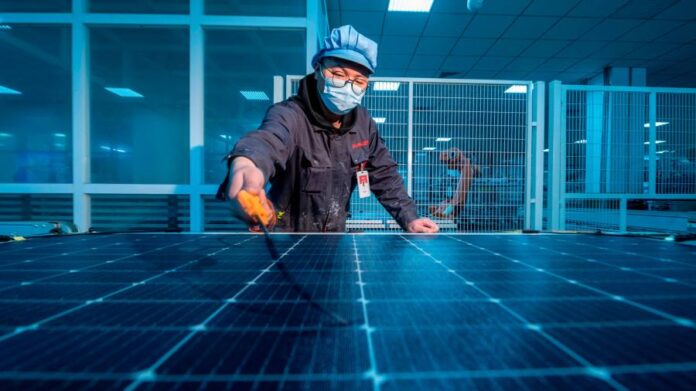Brussels is to impose curbs on imports of Chinese green technologies, demoting bidders for public contracts and making it harder for buyers to access subsidies.
The measures are expected to be unveiled by the European Commission on Thursday as part of a more aggressive drive to tackle China’s dominance in supplying products including solar panels and heat pumps.
Under a draft of the Net Zero Industry Act seen by the Financial Times, public procurement bids using products from a country with more than 65 per cent EU market share would be downgraded. Similar rules would apply to any government programme subsidising consumer purchases. “China is a prime example,” said a person familiar with the plans.
Ursula von der Leyen, commission president, has called for the EU to “de-risk” its exposure to China as Brussels seeks to reduce its dependency on the country’s manufactured goods and inches closers to the US’s tough stance on its communist regime.
China is responsible for more than 90 per cent of some parts used in solar panels, the document says, and is increasing its dominance of other supply chains including wind turbine production and electric vehicles. This trend has prompted policymakers to acknowledge that the EU is replacing a dependence on Russian gas for one on clean technology from China.
But the commission’s trade directorate is concerned that the proposed changes to the public procurement rule book could breach international rules, according to people familiar with the situation.
“It’s important that it is consistent with our WTO obligations, our government procurement agreement obligations,” said one, in reference to the World Trade Organization which bans discriminatory policies.
“An important element is to ensure that it doesn’t end up being some kind of green protectionism and that we do not make the green transition more expensive both for private companies and for taxpayers.”
The draft act could still change after internal discussions between commission departments ahead of its publication.
The draft proposal described the diversity of supply as a key component in the assessment of bids. “Supply shall . . . be deemed insufficiently diversified where a single third country supplies more than 65 per cent of the demand for a specific net zero technology within the union,” it says.
It would also assess the tenders’ environmental sustainability, which could count against Chinese imports.
In sectors where the EU industry is still strong, such as wind turbines and heat pumps, “our trade balance is deteriorating”, the draft warns, amid rising energy and input costs for European manufacturers. Brussels intends to reverse this trend by intervening in the market with the goal of increasing EU production of green technologies to 40 per cent by 2030.
The commission will also seeks to boost nascent carbon capture technology by requiring big oil and gas extractors to commit to storing up to 50mn tonnes of CO₂ annually by 2030, with each company given an individual target. Eadbhard Pernot, policy manager at the NGO Clean Air Task Force, said such targets were the “first of a kind”.
A separate proposal on critical raw materials on Thursday will be aimed at facilitating domestic mining of lithium and other minerals used in green technology. Brussels intends to introduce tougher environmental measures to restrict imports, according to a draft version of the text which is still being finalised.
After the commission publishes its proposals the European parliament and member states have to agree before they become law, a process which can take up to two years.
China on Wednesday demanded that European countries implementing significant environmental trade measures submit a written report to the WTO so its members could discuss their legal basis, impact on trade, consistency with international rules and how those measures might impact developing countries, a Geneva-based trade official said. Beijing wanted to start with the EU’s carbon border tax, which will force foreign importers to cover the cost of their CO₂ emissions as of 2026.
Credit: Source link















